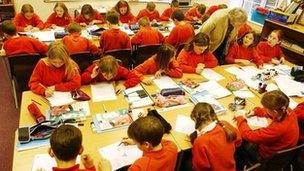Primary school pupils ranking: Your views
- Published

Primary schools could have a new curriculum and a new way of being measured
Primary school pupils in England could be ranked directly against their peers across the country, under government plans.
Pupils aged 11 would be ranked in 10% ability bands and parents told where their children were placed.
But head teachers' leaders described the plans, which could come in 2016, as "disappointing and destructive".
BBC News website readers have been responding to the government's proposals.
Maria Kirkland, lecturer and parent, from Lancashire
I am currently a lecturer at a further education institution but have a child at primary school.
My little boy is seven now and has just completed his Sats at Key Stage 2.
He has achieved high grades which are beyond his years so I welcome this positively.
As a parent I would like to know clearly at what level my child is working at in order to support and encourage further development.
Literacy and numeracy are key to their development and therefore if they need extra support, they will be able to clearly identify [that] and put it in place.
Parents would be able to focus their learning with their child in their weaker areas.
I believe in being "secondary ready" because it is a big step up and children need to be in that frame of mind before they go.
At the end of the day, all institutions are measured in one way or another, and if the standards are improved, then all is good.
Mark Layzell, parent, from Cambridgeshire

Mark Layzell: "Any help the schooling system can give me to monitor progress is welcomed"
I have three children, aged six, four and two.
I welcome an assessment structure that allows me to know how my children are developing in relation to their peers.
If one of my children is falling behind in a subject and would benefit from some extra attention or a different method of learning, why wouldn't I want to know so I can make the necessary changes?
Striking an appropriate balance with children's development can be very hard.
Any help the schooling system can give me to monitor the progress of my children is welcomed.
I don't find a general banding of achievement very helpful.
I want to ensure that my children are ready for secondary school before they leave primary school, not when it is too late.
Martin Butcher, school governor and parent, from Hertfordshire

Martin Butcher: "This is a disastrous policy for children"
As a parent of two primary aged children, and as a primary school governor, I object vehemently to this plan.
We dropped the 11-plus because it told children they had failed by the age of 11.
Publishing a national league table of children will do the same.
My eldest was scared before his Sats that if he did badly he would never be able to go to university.
Kids don't need this pressure, and they certainly don't need to be given a ranking against all other kids in the country.
Parents already know how their kids are doing. If they make a [Level] 4B in maths and English at age 11, they're about average. If they do better, then all well and good.
There are so many factors that need to be taken into account.
My eldest was sick during Year 5 [and] missed a very substantial amount of school time - yet in his Sats he scored above average in all subjects, yet the maths result in particular does not measure his ability [as] well as it reflects the fact he had to catch up months of school work before being able to forge ahead.
It appears that his ability is lower, on the Sats snapshot, than it actually is. This is a disastrous policy for children, and will destroy the ambitions of more than it helps.
Mario Rodgers, head teacher, from Essex
This is a step too far!
As a primary head teacher I have been a supporter of some of the coalition's approach to raising standards, particularly in the early years.
However, ranking individuals is making things too personal.
I can't see the point of this silly idea. It could really backfire.
Hold schools accountable, by all means, punish parents of those with poor attendance, but don't risk shattering the confidence of pupils who try their best day in and day out.
Compiled by Andrée Massiah
- Published17 July 2013
- Published17 July 2013
- Published17 July 2013
- Published16 July 2013
- Published11 July 2013
- Published8 July 2013
- Published8 July 2013